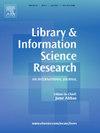Influence of cognitive and emotional frames on Weibo users' information dissemination behavior in natural disaster emergencies: The moderating effect of psychological distance
Abstract
In the context of sudden natural disasters, people are easily influenced by message frames, resulting in irrational dissemination behaviors. A theoretical model was built based on framing theory, and a least absolute shrinkage and selection operator (lasso) regression model was adopted to conduct empirical research on the impact of cognitive and emotional frames on user dissemination behaviors. Results show that (1) cognitive frame has a significant positive effect on users' content creation behavior; (2) emotional frame contained has a significant positive effect on users' content integration behavior; and (3) psychological distance weakened the influence of primary cognition and positive and negative emotions on dissemination behavior but strengthened the influence of secondary cognition on dissemination behavior. The findings enrich framing theory in natural disaster emergencies from the psychological language perspective and have important practical implications for authorities and microblogging platforms to guide users more effectively during emergencies.

 求助内容:
求助内容: 应助结果提醒方式:
应助结果提醒方式:


